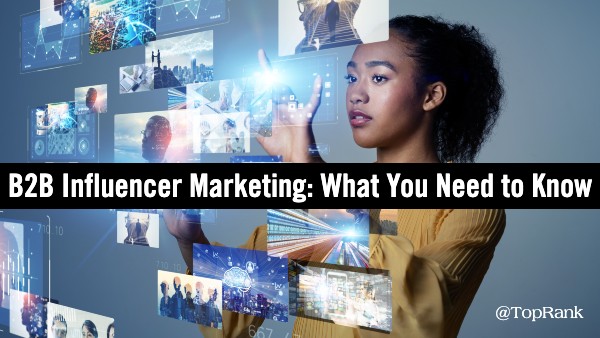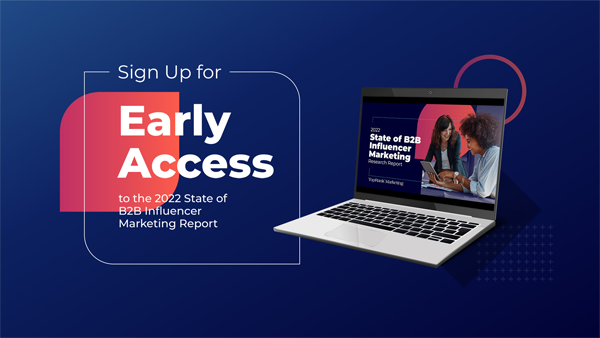
In HubSpot’s 2022 Marketing Industry Trends Report featuring insights from over 1,000 global marketers, influencer marketing was named the top marketing trend.
What is even more promising is that content formats ideal for engaging influencers including short form video and virtual events were also in the top 5 marketing tactics from the coming year.
As we bring 2021 to a close, Marketers all over the world are making decisions about how to come out of the pandemic era with trust, confidence and improved marketing results. More than ever, digital experiences, authenticity and the ability to connect with customers in meaningful ways are essential for success in the new year.
So what role does influence play for B2B marketers that want to make 2022 a marketing and customer success story? From getting started, to picking influencers, trends, mistakes to avoid and measurement – here are insights driving some of the most successful B2B brands in the world in to count on content partnerships with industry experts, key opinion leaders and influencers.
Getting started with B2B influencer marketing
B2B marketers that want to get started working with influencers have as many options as they do marketing goals. One area to focus on is to identify those who are already behaving as influencers for their brand with audiences that matter. In many cases these are customers but can also be industry partners, members of the brand’s community or even internal subject matter experts.
Finding brand advocates and engaging with them is a good starting point to building the kinds of relationships that can produce high quality, trusted content and even a community. Starting out, engagement could be as simple as interacting on social channels or it could be an invitation to contribute expertise to relevant brand content that aligns with the interests and goals of the influencers.
These basic efforts can help a brand start to understand the value of intentionally engaging with people in a position to contribute, share and advocate for the brand. Working with influencers in this way builds influence for the brand with current and prospective customers as well as in the industry.
For B2B marketers that want to accelerate their entry into working with influencers, an influencer content marketing pilot campaign could be a smart way to test the waters, capture data and build a solid business case for ongoing investment in an always-on influencer program (or not).
Scaling influencer marketing efforts with more established and professional influencers and building an influencer community requires software and deeper expertise, especially when it comes to managing paid influencers, a larger number of influencers, oversight of content, compliance with FTC guidelines, performance management and optimization. Of course, an established B2B Influencer Marketing Agency can help with all of that!
The top mistake B2B brands make when it comes to influencer marketing
In the B2B marketing mix, working with influencers is still relatively new and a lot of B2B brands view that work though a B2C lens. They see business influencers simply as another channel like advertising.
The reality is that influencer marketing for B2B is a relationship business. When B2B marketers treat influencer engagement transactionally, they really only tap the surface of what’s possible.
Just imagine having the most trusted voices in your industry partnering with your brand, building trust with potential customers and co-creating content in formats buyers actually want to consume.
What could you accomplish when those trusted experts are driving conversations in the marketplace in the direction of your solutions and in the direction of your brand?
Thinking of influencers simply as a transactional ad buy is a short term view at those cost of much larger, long term benefits that can come out of genuine relationships. This is just one of many mistakes B2B marketers make when it comes to working with influencers, so here are 49 more to avoid.
Key characteristics of top B2B industry influencers
Understanding who an influencer is for a particular B2B brand starts by understanding how influencers can create value for the brand’s customers and on what topics. The knowledge to do that is going to come from data.
For example, in the way that keywords are used in search engine optimization to make brand content more relevant for search engines, influencer marketing relies on topics to help identify the most relevant influencers for a brand.
So you have to figure out what topics you want to be influential about and ideally use data from an influencer marketing platform to score potential influencers on basic dimensions like topical relevance, how well the audience of the influencer engages on that topic and of course network size.
Once you have a list of candidate influencers ranked by relevance, resonance and reach, there are certain traits you’ll want to look for so you have a better chance of a successful outcome.
For B2B influencers the first of those traits is proficiency. In other words, where the influencer has documented and proven expertise on the topic.
There’s also popularity – how big of a network the influencer has and on what channels?
Then there’s personality, which is often not easy to find in B2B – but it’s getting better. If you expect the influencer to be a host of brand podcast or video series for example, they’re going to need to bring both charisma and expertise in order to engage the audience.
Publishing is another capability good B2B influencers have and that means what channels or platforms for publishing does the influencer have available? Do they have a podcast? A weekly LinkedIn Live or YouTube show? A blog? A column in a relevant industry publication? A newsletter?
Last is promotion where the influencer can promote brand content they helped contribute to. If an influencer is an expert but they never promote, a sudden increase in promotion of a certain brand isn’t going to go over well with their audience.
You’ll rarely find all of these traits and capabilities in one influencer but the number of professional influencers and creators in the B2B world is increasing. That’s both an opportunity for B2B brands to work with professionals who are comfortable, creative and capable of doing the job as well as a business opportunity for those influencers who can deliver.
Key metrics for a B2B influencer marketing program
How marketers should best measure any marketing program is directly tied to the objectives and associated KPIs for that specific set of tactics, audience and outcomes. Measuring influencer marketing for B2B companies is really no different.
In most cases, B2B influencer marketing programs involve content, so the metrics associated with content marketing all apply. In my experience, that means measuring performance of efforts to attract attention to content, metrics that reflect engagement with that content and measuring conversions whether they are downloads, subscriptions, demos, registrations or inquiries to sales.
WIth influencer marketing however, we also have an opportunity to do more than just co-create content for demand generation. Engaging the most trusted voices in your industry to drive conversations about topics that align with your B2B brand’s solutions can be measured in more ways than how well a blog post, ebook or webinar have performed.
B2B brands that create communities of influencers that truly influence the industry will also want to track the brand’s share of voice with that influencer community. For example, benchmarking the frequency of brand mentions by those influencers (as well as of competitors) and continuing to monitor over time will show the increase in influencer engagement with the brand and topics that matter to the brand.
A B2B brand that can drive qualitative conversations in the market with the most trusted voices is in a powerful position to become the best answer for what buyers are looking for. This doesn’t happen overnight of course – it takes time and effort through an always-on approach to influencer engagement. In fact, our research found that 12 times more B2B marketers were very successful with their influencer marketing programs that used an always-on approach compared to those who used periodic campaign activations.
As a result, relationship metrics matter just as much with B2B influencer marketing as the content and social media metrics.
Where the B2B marketing industry is headed
If anything, the pandemic has accelerated digital transformation in the B2B world affecting virtually all areas of business including marketing. And buyer behavior too.
Think about it – we went from 50% of buyers holding off on purchases to something like 80% of sales happening in digital channels. As a result, the vast majority of B2B marketers that pivoted will now continue their digitally focused go to market models for the next 12 months or more. Many marketers found their digitally focused go to market models to be as or more effective than what they were doing before.
Without a doubt, the next few years will be very interesting in the B2B marketing industry. We’ll definitely see a continuation of the emphasis on digital engagement, experience and a growing trend towards B2B e-commerce. Also, content will still be king, experiences are everything and I think the role of influence in digital channels will become even more important.
Just as an example, in early 2020, B2B sales spent about 80% of their time on the road with clients. But now abut 70% of B2B decision makers say they prefer remote human interactions or digital self-service. This means B2B marketers must be able to engage digitally in ways that empower buyers to pull themselves through most of the sales process.
To do that, B2B marketers must evolve from brand centric to customer centric marketing experiences. Sophisticated B2B marketers are already successfully using partnerships with the most trusted voices in the industry (aka influencers) in conjunction with experienced resources and proven strategies to enable content experiences that can attract, engage and convert with the buyer in the driver’s seat and that trend will continue in 2022 and beyond.



